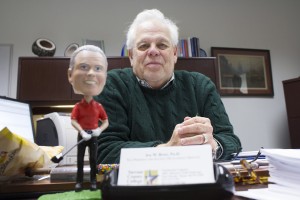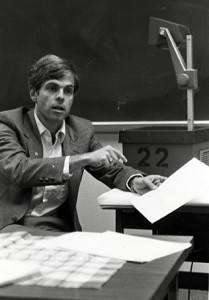By Rodrigo Valverde/reporter
TCC’s Joe Rode uses positivity, kindness to help connect with students in his career
A lesson to be learned is to treat all people with respect and kindness because they may turn up again in one’s life.
NW student development services vice president Joe Rode takes that lesson to heart.

Photos by Caitlin Herron/The Collegian
He lives every day following the philosophy of psychologist Alfred Adler that centers on the belief that every individual, regardless of age or sex, is a one, not a two or a half.
What this means is that every individual deserves to be treated with equal respect and that his or her viewpoint matters.
“As I go about my day meeting students and working with colleagues, not only do I attempt to always treat them with respect, I try very hard to get to know each person and their unique story,” he said.
Rode began his TCC career on NE Campus in 1972 as a counselor and psychology instructor. During this time, Chancellor Erma Johnson Hadley was a fellow NE faculty member and NW president Elva LeBlanc was one of his students.
Rode moved to NW when it opened in 1976 as director of counseling and completed his doctorate in 1981 at the University of North Texas.
During his 40-plus years at TCC, Rode has served all four chancellors, watched the college change its name from TCJC, build three campuses and grow to serving more than 100,000 individuals a year.
With his philosophy of equality, Rode takes the time to communicate to students whom he must sanction for disciplinary violations that he values them and respects them.
“I always communicate with respect and identify the specific behavior, not the person, that led to the disciplinary action being taken,” Rode said. “I always wish them well and express my hope that they will learn from their mistakes and become better citizens of our college.”
Interaction and communication are such key points to Rode that he makes it a personal goal to talk with a student every day. And though meetings sometimes keep him from accomplishing his goal, he tries to make up for those days by reaching out to students in clubs, programs and other events that occur on campus.
Rode has also been known to work the campus parking lots in August in shorts and a T-shirt greeting students and welcoming them as they walk toward the buildings.
“I must admit that I get some very surprised looks from students as I greet them and ask if they know where they need to go,” he said.

He also finds it rewarding to serve as a mentor to students who may need some support and encouragement. However, students are not the only ones who find him impactful and a joy to be around. Rode has garnished a reputation as “Mr. Positivity” within the faculty and staff.
Administrative assistant Ruth Gonzalez has worked at TCC for 30 years, 12 of them as Rode’s secretary.
“I highly respect him and the authority figure that comes with the responsibility of being our vice president for student development services,” she said.
Gonzalez likes that Rode holds true to an open door policy by welcoming students with problems as well as students without problems.
“There is a charisma about him where people leave his office happy,” she said. “You can tell he loves his job, and he always makes my job easy.”
Student support coordinator Leon Minor shares Gonzalez’s sentiments.
“He makes me look forward to coming to work everyday,” he said.
Minor says he has learned a lot working with Rode, such as ways to improve his presentation and professional skills, and strives to always emulate Rode’s welcoming environment.
“He’s an awesome, awesome human being and always reminds me why I originally started doing what I’m doing now,” Minor said.
Having witnessed the frequency of mass shootings in schools led Rode to help create and develop the NW CARE Team modeled after the initial team created on TR Campus.
Together with Minor, Rode and the CARE Team assist hundreds of students across all five campuses who experience distress or may be a potential threat to themselves or others.
“I think the district’s CARE Teams along with our faculty and staff partners who identify and refer students in distress is one of the best and most rewarding achievements of my tenure,” Rode said.
When explaining why he continues to do what he’s doing after so many years, Rode simply says that he’s still having fun and his students keep him young.
“I believe that every person we meet is unique and has a story worth telling and worth being listened to and understood,” he said. “Such connections are what bind us all, both personally and in retention sense as well. Never forget that I believe each of us can and should choose to engage with our students when and wherever possible as it is these relationships that truly make us happy.”

























